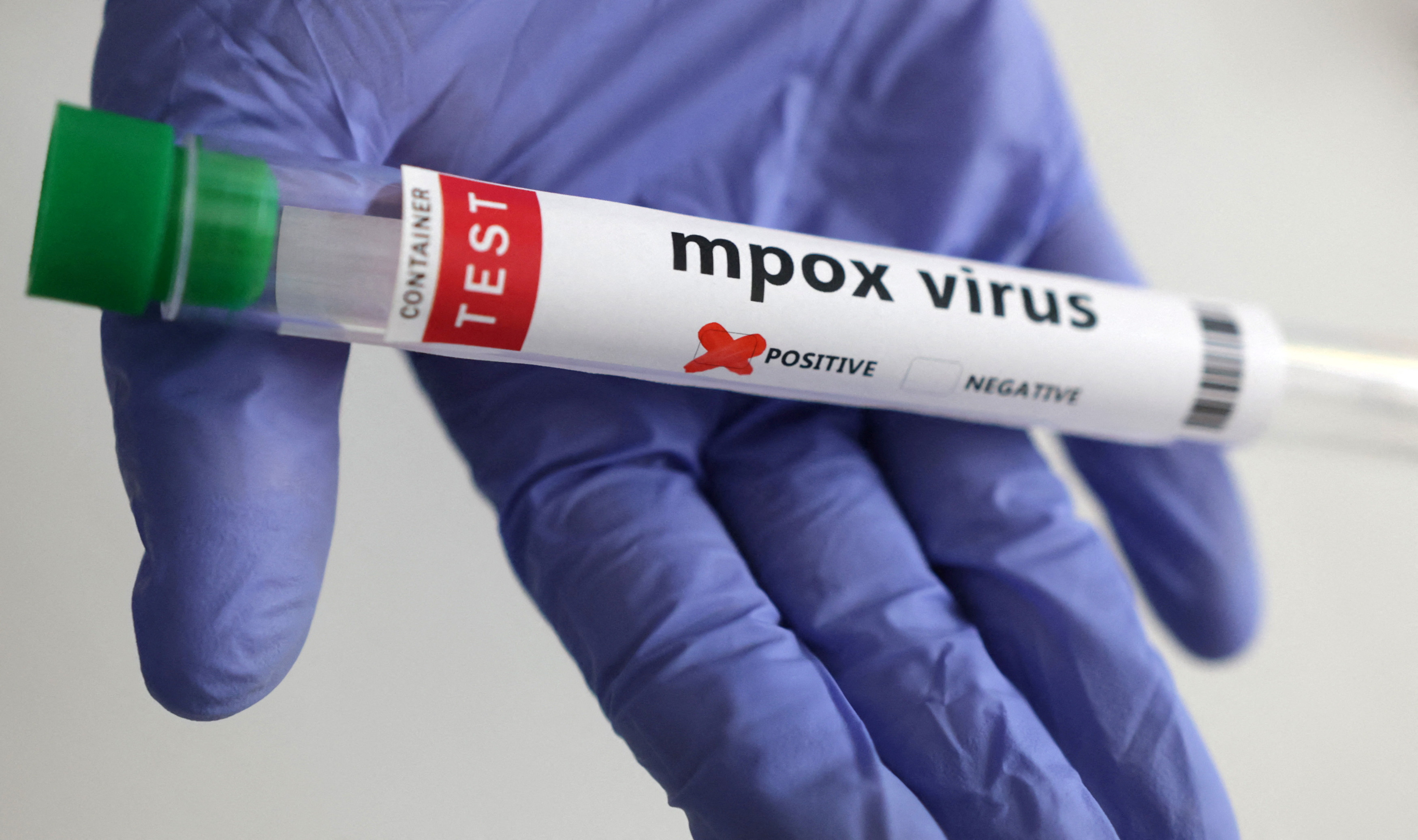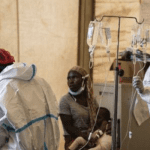An initial 899,000 vaccine doses have been allocated for nine countries throughout Africa that have been heavily affected by the current Mpox epidemic.
The vaccine allocation will help the Central African Republic, Cote d’Ivoire, the Democratic Republic of the Congo, Kenya, Liberia, Nigeria, Rwanda, South Africa, and Uganda.
The Democratic Republic of Congo, which has four out of every five confirmed cases in Africa this year, will receive 85% of the approximately 900,000 pills allotted.
The Access and Allocation Mechanism (AAM) is an initiative of the World Health Organization to increase access to Mpox vaccines, treatments and diagnostic tests.
The WHO declared Mpox a global public health emergency for the second time in two years in August after a new variant of the virus, called clade Ib, spread from the Democratic Republic of Congo to neighboring countries.

The Democratic Republic of the Congo and Rwanda have already carried out limited vaccinations.
In mid-August, WHO proclaimed the Mpox outbreak in the Democratic Republic of the Congo and neighboring countries to be a public health emergency of international concern, while Africa CDC called it a public health emergency of continental security.
Read: https://www.tvcnews.tv/2024/09/first-batch-of-mpox-vaccines-arrive-in-drc/
This year alone, 19 African countries have recorded cases of Mpox, and the illness is still spreading.
The Democratic Republic of the Congo remains the epicenter of the outbreak, with over 38,000 suspected cases and more than 1000 deaths documented this year.
Other countries have pledged more than 3.6 million doses of vaccine for the Mpox response.
An initial 899,000 vaccine doses have been allocated for nine countries throughout Africa that have been heavily affected by the current Mpox epidemic.
The vaccine allocation will help the Central African Republic, Cote d’Ivoire, the Democratic Republic of the Congo, Kenya, Liberia, Nigeria, Rwanda, South Africa, and Uganda.
The Democratic Republic of Congo, which has four out of every five confirmed cases in Africa this year, will receive 85% of the approximately 900,000 pills allotted.
The Access and Allocation Mechanism (AAM) is an initiative of the World Health Organization to increase access to Mpox vaccines, treatments and diagnostic tests.
The WHO declared Mpox a global public health emergency for the second time in two years in August after a new variant of the virus, called clade Ib, spread from the Democratic Republic of Congo to neighboring countries.

The Democratic Republic of the Congo and Rwanda have already carried out limited vaccinations.
In mid-August, WHO proclaimed the Mpox outbreak in the Democratic Republic of the Congo and neighboring countries to be a public health emergency of international concern, while Africa CDC called it a public health emergency of continental security.
Read: https://www.tvcnews.tv/2024/09/first-batch-of-mpox-vaccines-arrive-in-drc/
This year alone, 19 African countries have recorded cases of Mpox, and the illness is still spreading.
The Democratic Republic of the Congo remains the epicenter of the outbreak, with over 38,000 suspected cases and more than 1000 deaths documented this year.
Other countries have pledged more than 3.6 million doses of vaccine for the Mpox response.
An initial 899,000 vaccine doses have been allocated for nine countries throughout Africa that have been heavily affected by the current Mpox epidemic.
The vaccine allocation will help the Central African Republic, Cote d’Ivoire, the Democratic Republic of the Congo, Kenya, Liberia, Nigeria, Rwanda, South Africa, and Uganda.
The Democratic Republic of Congo, which has four out of every five confirmed cases in Africa this year, will receive 85% of the approximately 900,000 pills allotted.
The Access and Allocation Mechanism (AAM) is an initiative of the World Health Organization to increase access to Mpox vaccines, treatments and diagnostic tests.
The WHO declared Mpox a global public health emergency for the second time in two years in August after a new variant of the virus, called clade Ib, spread from the Democratic Republic of Congo to neighboring countries.

The Democratic Republic of the Congo and Rwanda have already carried out limited vaccinations.
In mid-August, WHO proclaimed the Mpox outbreak in the Democratic Republic of the Congo and neighboring countries to be a public health emergency of international concern, while Africa CDC called it a public health emergency of continental security.
Read: https://www.tvcnews.tv/2024/09/first-batch-of-mpox-vaccines-arrive-in-drc/
This year alone, 19 African countries have recorded cases of Mpox, and the illness is still spreading.
The Democratic Republic of the Congo remains the epicenter of the outbreak, with over 38,000 suspected cases and more than 1000 deaths documented this year.
Other countries have pledged more than 3.6 million doses of vaccine for the Mpox response.
An initial 899,000 vaccine doses have been allocated for nine countries throughout Africa that have been heavily affected by the current Mpox epidemic.
The vaccine allocation will help the Central African Republic, Cote d’Ivoire, the Democratic Republic of the Congo, Kenya, Liberia, Nigeria, Rwanda, South Africa, and Uganda.
The Democratic Republic of Congo, which has four out of every five confirmed cases in Africa this year, will receive 85% of the approximately 900,000 pills allotted.
The Access and Allocation Mechanism (AAM) is an initiative of the World Health Organization to increase access to Mpox vaccines, treatments and diagnostic tests.
The WHO declared Mpox a global public health emergency for the second time in two years in August after a new variant of the virus, called clade Ib, spread from the Democratic Republic of Congo to neighboring countries.

The Democratic Republic of the Congo and Rwanda have already carried out limited vaccinations.
In mid-August, WHO proclaimed the Mpox outbreak in the Democratic Republic of the Congo and neighboring countries to be a public health emergency of international concern, while Africa CDC called it a public health emergency of continental security.
Read: https://www.tvcnews.tv/2024/09/first-batch-of-mpox-vaccines-arrive-in-drc/
This year alone, 19 African countries have recorded cases of Mpox, and the illness is still spreading.
The Democratic Republic of the Congo remains the epicenter of the outbreak, with over 38,000 suspected cases and more than 1000 deaths documented this year.
Other countries have pledged more than 3.6 million doses of vaccine for the Mpox response.
An initial 899,000 vaccine doses have been allocated for nine countries throughout Africa that have been heavily affected by the current Mpox epidemic.
The vaccine allocation will help the Central African Republic, Cote d’Ivoire, the Democratic Republic of the Congo, Kenya, Liberia, Nigeria, Rwanda, South Africa, and Uganda.
The Democratic Republic of Congo, which has four out of every five confirmed cases in Africa this year, will receive 85% of the approximately 900,000 pills allotted.
The Access and Allocation Mechanism (AAM) is an initiative of the World Health Organization to increase access to Mpox vaccines, treatments and diagnostic tests.
The WHO declared Mpox a global public health emergency for the second time in two years in August after a new variant of the virus, called clade Ib, spread from the Democratic Republic of Congo to neighboring countries.

The Democratic Republic of the Congo and Rwanda have already carried out limited vaccinations.
In mid-August, WHO proclaimed the Mpox outbreak in the Democratic Republic of the Congo and neighboring countries to be a public health emergency of international concern, while Africa CDC called it a public health emergency of continental security.
Read: https://www.tvcnews.tv/2024/09/first-batch-of-mpox-vaccines-arrive-in-drc/
This year alone, 19 African countries have recorded cases of Mpox, and the illness is still spreading.
The Democratic Republic of the Congo remains the epicenter of the outbreak, with over 38,000 suspected cases and more than 1000 deaths documented this year.
Other countries have pledged more than 3.6 million doses of vaccine for the Mpox response.
An initial 899,000 vaccine doses have been allocated for nine countries throughout Africa that have been heavily affected by the current Mpox epidemic.
The vaccine allocation will help the Central African Republic, Cote d’Ivoire, the Democratic Republic of the Congo, Kenya, Liberia, Nigeria, Rwanda, South Africa, and Uganda.
The Democratic Republic of Congo, which has four out of every five confirmed cases in Africa this year, will receive 85% of the approximately 900,000 pills allotted.
The Access and Allocation Mechanism (AAM) is an initiative of the World Health Organization to increase access to Mpox vaccines, treatments and diagnostic tests.
The WHO declared Mpox a global public health emergency for the second time in two years in August after a new variant of the virus, called clade Ib, spread from the Democratic Republic of Congo to neighboring countries.

The Democratic Republic of the Congo and Rwanda have already carried out limited vaccinations.
In mid-August, WHO proclaimed the Mpox outbreak in the Democratic Republic of the Congo and neighboring countries to be a public health emergency of international concern, while Africa CDC called it a public health emergency of continental security.
Read: https://www.tvcnews.tv/2024/09/first-batch-of-mpox-vaccines-arrive-in-drc/
This year alone, 19 African countries have recorded cases of Mpox, and the illness is still spreading.
The Democratic Republic of the Congo remains the epicenter of the outbreak, with over 38,000 suspected cases and more than 1000 deaths documented this year.
Other countries have pledged more than 3.6 million doses of vaccine for the Mpox response.
An initial 899,000 vaccine doses have been allocated for nine countries throughout Africa that have been heavily affected by the current Mpox epidemic.
The vaccine allocation will help the Central African Republic, Cote d’Ivoire, the Democratic Republic of the Congo, Kenya, Liberia, Nigeria, Rwanda, South Africa, and Uganda.
The Democratic Republic of Congo, which has four out of every five confirmed cases in Africa this year, will receive 85% of the approximately 900,000 pills allotted.
The Access and Allocation Mechanism (AAM) is an initiative of the World Health Organization to increase access to Mpox vaccines, treatments and diagnostic tests.
The WHO declared Mpox a global public health emergency for the second time in two years in August after a new variant of the virus, called clade Ib, spread from the Democratic Republic of Congo to neighboring countries.

The Democratic Republic of the Congo and Rwanda have already carried out limited vaccinations.
In mid-August, WHO proclaimed the Mpox outbreak in the Democratic Republic of the Congo and neighboring countries to be a public health emergency of international concern, while Africa CDC called it a public health emergency of continental security.
Read: https://www.tvcnews.tv/2024/09/first-batch-of-mpox-vaccines-arrive-in-drc/
This year alone, 19 African countries have recorded cases of Mpox, and the illness is still spreading.
The Democratic Republic of the Congo remains the epicenter of the outbreak, with over 38,000 suspected cases and more than 1000 deaths documented this year.
Other countries have pledged more than 3.6 million doses of vaccine for the Mpox response.
An initial 899,000 vaccine doses have been allocated for nine countries throughout Africa that have been heavily affected by the current Mpox epidemic.
The vaccine allocation will help the Central African Republic, Cote d’Ivoire, the Democratic Republic of the Congo, Kenya, Liberia, Nigeria, Rwanda, South Africa, and Uganda.
The Democratic Republic of Congo, which has four out of every five confirmed cases in Africa this year, will receive 85% of the approximately 900,000 pills allotted.
The Access and Allocation Mechanism (AAM) is an initiative of the World Health Organization to increase access to Mpox vaccines, treatments and diagnostic tests.
The WHO declared Mpox a global public health emergency for the second time in two years in August after a new variant of the virus, called clade Ib, spread from the Democratic Republic of Congo to neighboring countries.

The Democratic Republic of the Congo and Rwanda have already carried out limited vaccinations.
In mid-August, WHO proclaimed the Mpox outbreak in the Democratic Republic of the Congo and neighboring countries to be a public health emergency of international concern, while Africa CDC called it a public health emergency of continental security.
Read: https://www.tvcnews.tv/2024/09/first-batch-of-mpox-vaccines-arrive-in-drc/
This year alone, 19 African countries have recorded cases of Mpox, and the illness is still spreading.
The Democratic Republic of the Congo remains the epicenter of the outbreak, with over 38,000 suspected cases and more than 1000 deaths documented this year.
Other countries have pledged more than 3.6 million doses of vaccine for the Mpox response.














